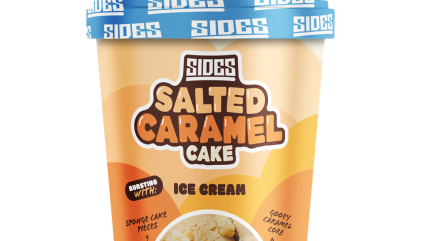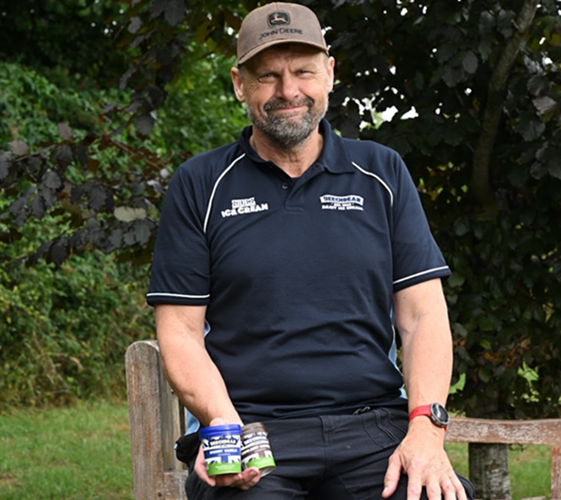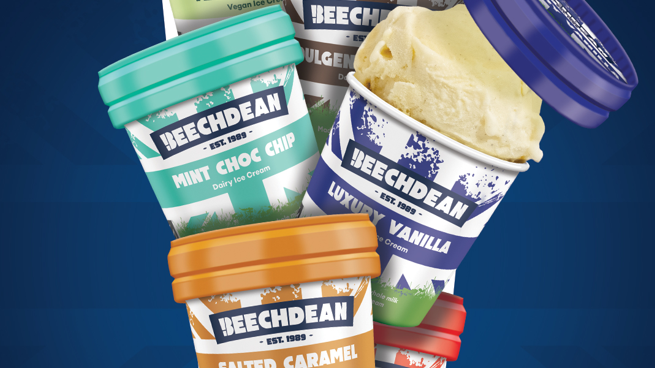
Pricier ice cream has become big business in the UK, with consumers seeking innovative and even celebrity-backed products – and Beechdean is at the heart of the action.
Producing more than a million portions a day, the Buckinghamshire-based family business has established itself as a major player in what the company says is a £1.5bn ($2bn) UK ice-cream market.

Discover B2B Marketing That Performs
Combine business intelligence and editorial excellence to reach engaged professionals across 36 leading media platforms.
While the bulk of Beechdean’s sales come through own-label partnerships with retailers such as Aldi, Morrisons and Asda, Beechdean has attracted attention for its product tie-ups that include producing ice cream for YouTube collective The Sidemen’s food brand, Sides.
Beechdean, which operates a four-day working week and employs 85 staff, has had to make some tough choices along the way. After experiencing major setbacks with Brexit and Covid-19, the firm parted ways with Marks and Spencer towards the end of last year with Beechdean managing director Andrew Howard, citing a lack of a “collaborative” partnership.
Yet Beechdean continues to build momentum in its efforts to carve out a position in a crowded market. It has a new product in the pipeline with UK frozen-food retailer Iceland, has been recently recognised at Morrisons’ supplier awards and is eyeing double-digit growth over the next three years.
Just Food sat down with Howard to discuss Beechdean’s performance, the challenges of own-label supply and where the UK ice cream category is heading next.

US Tariffs are shifting - will you react or anticipate?
Don’t let policy changes catch you off guard. Stay proactive with real-time data and expert analysis.
By GlobalDataKristian Bayford (KB): Beechdean was recently recognised with an award in frozen innovation by Morrisons. What other retailers are you producing own-label items for?
Andrew Howard (AH): What you saw was the legacy of three years’ work, which you’ll have seen with Morrisons, where we won the frozen innovation award for our Jammy Doughnut Ice Cream.
We are now making own label for Asda, Morrisons and Aldi. I’ve just got off a phone call with Aldi Germany and we also supply Aldi Australia.
A third of our business is still foodservice but we’ve taken an opportunity in a marketplace that needs a bit of disruption [and], most importantly, it needs alternatives.
“We’ve just launched two new products with Iceland and we’ve got a new product coming out of Iceland next week. We built a business that is reliant on a partnership. In other words, it doesn’t work unless the customer wants to work collaboratively. We’ve now delisted M&S because they didn’t want to work in a collaborative manner.
Our way of business only works if the customer wants to work collaboratively, because we’re reliant on them wanting to speed up and wanting to change and wanting to try new things.
KB: Which sales channel – grocery retail and foodservice – is most important to your growth strategy and why?
AH: We’re in a £1.5bn market and the reality is we could fill our factories with own-label business. We now turn over about £32m-£34m and we’ve just gone through a multi-million-pound investment within the factory that gives us a £50m capacity.
We’ve had 100% supply with Aldi this year. We haven’t had a single product drop out due to production and that means their cabinets are always full. But you need a partnership for them to appreciate that that has a value and that’s exciting for us, because they see that as a value.
Having lost 85% of our business in Covid, who knows what the next world calamity might be? Therefore, we’re trying to split our business into a third own label, a third foodservice and then a third brand and license.
We’ve just signed a new contract for a very exciting licence next year, which will be as important to us as Cadbury’s was to Frederick’s in the early 2000s. We’re only getting these opportunities because people are seeing what we’re doing.
KB: Is that new contract staying undisclosed for now?
AH: Yes. For us, within the branded side, you either have something like Sides, which is a social media phenomenon that the consumer sees and then walks in, because they see it through social media, or you have an established brand that has the presence within the marketplace already, maybe not in ice cream, but in other products.
KB: You’ve recently partnered with The Sidemen as a manufacturer for their Sides ice cream. How might your product development differ when you’re working with on licences versus own-label retail?
AH: It doesn’t. If people say to me, ‘Andrew, where can I buy your ice cream?’ I’ll say, ‘go to Aldi.’ The thing is, I couldn’t say that about M&S, and that’s the reason why we stopped with them.
In terms of major licences for us that we control, we won’t ever put a licence that conflicts with another licence. For example, Sides doesn’t conflict with this new one, because Sides is very much Häagen-Dazs territory.
Everything should be run like a football team; it would be so much easier in life
I ran a football club for a few years. I was chairman. The hardest job of being chairman is you take all the bad stuff and none of the glory but what it taught you is that the glory is in the others succeeding. It’s a wonderful sensation to empower others to be successful. So, what’s the difference with our product? If we can empower Aldi to be successful, then great. Everything should be run like a football team; it would be so much easier in life.
What’s nice now is that they value your involvement, which means we’re now working on products for next year and the year after, which means we can develop their brand.
We are building that loyalty with Morrisons, Asda and Iceland. The problem is all these guys only have docking facilities for the big tankers. They don’t have docking facilities for little motorboats. What they’re all doing now is they’re all learning that having a motorboat tied up occasionally is exactly the right thing to do.
KB: Can you give me a breakdown of your annual sales – what percentage is through brands and what percentage is through retail own-label?
AH: We will do about 55% of own label. We’ll do about 0.5% Beechdean branded retail and around 5-6% of branded products in retail excluding Beechdean. Then all the rest is foodservice, like pub groups and theatres, which are much more of our traditional marketplace distribution. We are lucky enough to have central deals with Brakes, Bidfood and Eden Farm. We work best with the partners that want to work with us.
KB: How might that develop over the next few years?
AH: We make a million portions of ice cream a day. To put into perspective, we make five litres every eight seconds.
To a robot, a five-litre in eight seconds is insane. We’ve gone to Europe and found a partner that’s built us a machine and it’s more like a Transformer than a robot, if I’m honest. We’ve now got it programmed to replicate what we do. We just bought a robot that’s coming in September/October, where there’s only two in Europe at the moment.
Modern technology is awesome but putting it into the food industry is very difficult, because as food processors we want repetitive boringness. We used to make 20 half-litres a minute. Then we made 70 half-litres a minute. We now make 250 half- litres a minute.
We have three lines that are multi-packing different flavours of half-litre into cases. And, in that process, we have to put sauce in the middle, sauce on the outside, particulates in the middle, two flavours. We then have to decorate it. Innovation comes at a cost. Each one of those machines costs £500,000 and we just bought three of them.

KB: As well as ice cream, Beechdean also makes products including yogurt and vegan lines? What product has seen the most growth recently and what is your outlook for each of them?
AH: We do sorbets, ice creams, vegan ice cream, kefir ice cream. We don’t do any desserts. We only produce frozen products. As for growth, the one that surprised us the most was kefir ice cream but the one that has been the most successful recently is the novelty half-litre.
We’ve seen insane growth in sorbets this year but that’s just due to the climate. Once you go above 22-23 degrees of temperature and it starts getting hotter and hotter, rich dairy ice cream becomes less of an option – and sorbets and refreshments become more important. You’d expect sorbets to be high this year and they they’ve done really well.
KB: What is driving consumption of ice cream and frozen treats more widely?
AH: Price dictates that food is only going to get more expensive. There is a ceiling within certain retailers of what their consumers are willing to spend and pay. There’s definitely a move to quality but that quality is within the category of the ice cream.
If you think of the four main categories of ice cream, you’ve got value, entry-level, premium and top tier. What people are looking to do all the time is to trade at the top of their sector. Rather than have a cheap value ice cream, they want a slightly better value ice cream. Rather than having a cheap one-litre, they want a slightly better value one-litre.
If people [customers] are going to spend money, they want quality, value as well as commercial [acumen]. Commercial will always be the most important driver, categorically. I think our industry has forgotten what the fundamental element of what ice cream is.
KB: How has Beechdean positioned itself against multinational ice cream brands and smaller artisanal producers?
AH: We want the capacity of the tanker and the speed of the little boat. Firstly, we are flexible and versatile. Beechdean has a factory that can produce at the speed of the big boys but it’s not dependent on EBITDA and making stuff that we don’t want to make or we shouldn’t make. That’s critical in the business.
If a business is constantly pushed to run at capacity, irrespective of whether that product is correct for the business, then I think that’s pressure.
Secondly, we compete with the big boys by joining with the big boys. Aldi are now the second highest seller of ice cream in the UK by volume and third by price. That tells you that the volumes out there and the price is competitive.
Our amalgamation with Asda, Aldi, Morrisons and Iceland, they’re the brands that are competing against the big boys. We just make it. Can we compete against the big boys as a brand? No, we never can and we never will. Therefore, we need to partner with another brand that can. I’ll tell you in 12 months whether we’ve got that right.

KB: Do you see opportunities for expansion beyond the UK, or is the domestic market still the main priority?
AH: The domestic market will always be the biggest priority for us. Being a British manufacturer that uses as many British ingredients as we can, it’s important. We are a tiny portion of a £1.5bn market, so we would be silly to look too far.
Saying that, through current clients, we now supply dog ice cream to Australia, and it looks like we’re going to supply Germany next year.
KB: How has Beechdean performed over the last year and which areas of the business have seen the strongest growth?
AH: Retail has seen the strongest growth for us. We took a very conscious decision within foodservice. I think the pub market, and a lot of the foodservice market, at times, is struggling. Lots of pubs have been closing and I think it’s under massive pressure.
I think the pub market, and a lot of the foodservice market, at times, is struggling
Whilst we’ve had a great summer with really good weather, if we’d have had a summer like this 20 years ago, we’d have been absolutely rammed all year and all summer because of the uplift of ice cream.”
KB: What are your most recent sales and profits numbers and what do you forecast them to be for the current financial year?
AH: “We aim to run at about 5% profit. As we delisted a major retailer at the end of the year, that took a chunk of cash out of our [business] but we chose to reduce our business by that amount because we felt it wasn’t the right partner. We’ve grown because we’ve replaced that business to go forward again.
Over the next two to three years, we’re looking at growing probably between 10-15% a year, up to a cap of around £45-50m. This year we’re going to be fairly stable to where we were last year but that’s more due to the fact that we had a change of client base last year.
Next year, we’re looking at between 5-7% growth. What we’re looking to do all the time is build the clients that we’ve got and then, thereafter, we’re looking at about 10% over the next three to four years.
KB: What do you see as the biggest opportunities and challenges for the UK ice cream category over the next five years and where do you see Beechdean in that time?
AH: I think the biggest opportunities for us is building on what we’ve done with retailers like Aldi. As other retailers begin to trust us and get comfortable with us, then the opportunity is to build on that. On the foodservice side, we’re very excited about the new range we’re going to take out next year. One of the core drivers for us is getting back into the foodservice industry.
We’re only half the size we were in the foodservice industry that we were in 2019. That was our heartland business and we want to go back into that but, to do that, we have to be able to compete with the smaller guys that are doing a fantastic job. And that’s where we really feel is an opportunity.
The biggest growth opportunity is this brand partnership. It’s a whole new world for us. You know what they’re going to be doing, marketing-wise and delivery-wise. It’s another new journey and that’s exciting.





